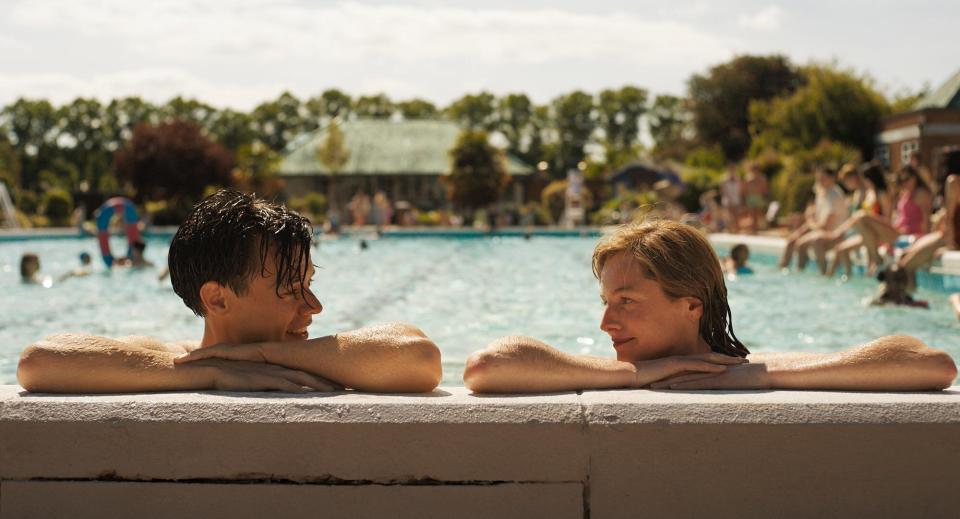My Policeman review: Harry Styles is a man of two minds in a lush but limited romantic drama

- Oops!Something went wrong.Please try again later.
My Policeman is a movie set in both 1957 and the late 1990s, based on a novel first published ten years ago. But when one of your featured actors is the biggest pop star in the world in 2022, strange things happen to the reality-distortion field around a film. Policeman, which had its North American premiere last night in Toronto, is in almost every way the most classic kind of high-toned British period piece: a tea-kettle swoon steeped in stolen gazes, flocked wallpaper, and long meaningful walks along windswept coastlines. But it is also the story of a love that, back then at least, dared not speak its name between a closeted young officer (Harry Styles), his naive bride-to-be (The Crown's Emma Corrin), and the man he actually has endless, gymnastic sex with (David Dawson).
The result, adapted by lauded London theater director Michael Grandage, is fevered, lovely to look at, and at times deeply silly; a plush romantic drama that somehow manages to be both explicit and decorous, like horny Merchant Ivory. Its title also could have been Everybody Loves Harry: He's the film's ever-elusive object of desire, a dimpled dreamboat named Tom who first comes to Corrin's Marion, a schoolteacher-in-training, on a Brighton beach, the elder brother of her childhood friend and a long-simmering crush who finally deigns to turn his attention her way. Within weeks they're seeing each other regularly, though it rarely turns physical outside a few polite grazes in the swimming pool ("He's a gentleman," she insists pluckily to a coworker). He's also eager to improve himself with art and literature, and she's glad enough to show him what she knows, even if they never seem to have much to talk about outside the water.

Amazon Prime Harry Styles stars in 'My Policeman' as a closeted cop named Tom who marries a schoolteacher (Emma Corrin).
One of those cultural expeditions leads to the local museum, where a dashing, courtly curator named Patrick (Dawson), whom Tom once met in a traffic accident on the job, is eager to expand their world with lectures and recitals. Patrick also naturally seems to ease the unspoken awkwardness between them, and soon the three of them have become a happy platonic throuple, having the kind of young-people fun that movie montages are made of. Or at least Marion believes it's all platonic; we know nearly from the beginning that it's not because of the film's framing device, in which a 40-years-older Marion (Gina McKee) has taken in Patrick (Rupert Everett), now an invalid badly impaired by a stroke, much to the chagrin if not outright fury of Tom (Linus Roache).
Patrick can hardly speak anymore, but a caregiver has also brought along a box of old things, including his diaries from those long-ago days. And as the flashbacks unfold, it's clear there was never much of a triangle at all: Tom and Patrick were crazy about each other. What the characters will do with this very British cycle of repression, release, and heroic self-denial is rendered in the script, by Ron Nyswaner (Philadelphia, The Painted Veil), in sometimes delicate but more often jarringly unsubtle ways. That's a hazard, maybe, of trying to adapt the internalized world of a novel for the screen: Subtext becomes bolded and underlined as characters rush to spell out their intentions or long-held secrets in ways that may serve the plot — or at least make for gorgeous, tragic metaphors — but rarely resemble real life.
While the casting of Everett and Roache seems as if it should have been swapped to more physically resemble their younger counterparts and Corrin feels sidelined as a character by design, the actors still do a lot to bring nuance where it doesn't always exist. Dawson (All the Old Knives) is quietly affecting as a man so used to subterfuge and fear that he's become defiant in the face of it; he knows the rules of survival as a gay man in a midcentury England where his "lifestyle" is still a felony crime, and how to somehow find pleasure in the cracks in between.
Styles' style is more remote: His Tom often feels like a cipher, thoughtful and charming one moment and heedlessly cruel and manipulative the next. That also makes sense in a way; Tom is, after all, a stranger to himself. And Styles doesn't hold back in the sex scenes, which seem destined to live a long life outside the film online and amongst his considerable fanbase. Otherwise Policeman, as emotionally earnest and elegantly made as it is, mostly feels like a movie we've seen many times before: a pleasantly escapist two hours with pretty people in pretty clothes, madly sublimating their feelings until the final, luminous frame. Grade: B–
Related content:

